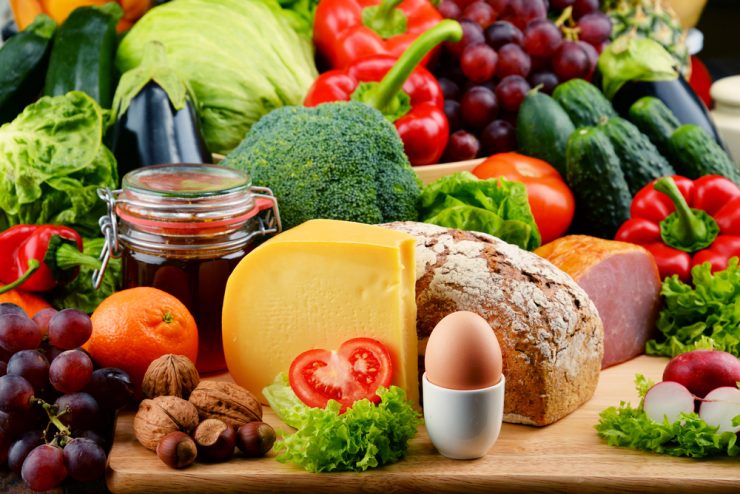“I am a 45-year-old woman and many of my friends are switching to a more plant-based diet, believing it to be better for their health as well as the environment. But is it really as healthy as some make out? Can you advise the healthiest away to approach a vegetarian diet?”
Editor Jane Garton looks at the ways in which a vegetarian diet can provide you with everything you need.
Vegetarian numbers are on the rise in the UK and the reasons more and more of us are turning towards a plant-based diet are many. They include health concerns, religion, a concern for animal welfare and the environment, or simply a change in taste. Technically, a vegetarian is anyone who does not eat meat, fish or fowl, or foods containing them.
More recently, the term is being adapted to fit a wider range of diets. For example, a flexitarian eats meat, poultry, and fish occasionally but for the most part enjoys a vegetarian diet. A lacto-vegetarian eats dairy products but not eggs, whilst an ovo-vegetarian eats eggs but not dairy products. Other dietary choices include pescatarians who eat fish but no meat or poultry, whilst a vegan eats no meat, poultry, fish, or animal products of any kind including dairy, eggs, gelatine or honey.
The health benefits
But whatever type and for whatever reason for eating a vegetarian diet, the health benefits are without doubt. For starters, a vegetarian diet can reduce the risk of developing and or dying from heart disease by a quarter, according to a 2016 review. In the same review vegetarians had an 8% lower risk of cancer, especially bowel cancer. Vegetarians also tend to have a lower BMI – body mass index – than meat-eaters. Studies show they also have lower levels of blood fats, blood sugar and blood pressure – all risk factors for diseases including type 2 diabetes, heart disease and dementia[i][ii].
Missing out on nutrients
The other side of the coin is that it can sometimes be hard for vegetarians to meet their protein needs, as well as certain trace minerals. Protein is essential for hormone production, the immune system and strong muscles and bones, particularly, as we age, and plant foods don’t contain all the essential amino acids found in animal produce. Vegetarians may also have low levels of certain minerals such as the easily absorbable heme-iron found in meat. You will also be missing out on Vitamin B12, only found in foods of animal origin. A lack of vitamin B12 can result in pernicious anaemia and low energy levels so supplementation should definitely be considered.
If you are thinking about making the switch, a few simple tweaks to your diet can make up for the lack of animal produce in your daily menu. Meal planning is an essential part of ensuring you are meeting all your nutrition needs.
For protein:
Eat plenty of pulses, soya products, nuts and seeds, eggs and cheese (if you’re not going vegan).
For iron:
Iron can be found in vegetarian sources such as pulses, nuts, seeds, cereals, green leafy vegetables, tofu, dried fruit, molasses and fortified foods. Vitamin C helps boost uptake so have a piece of fruit or some vegetables at the same time. Alternatively, go for a glass of orange juice with your breakfast or a fresh fruit salad as a dessert or starter.
For zinc:
Put milk and dairy products, eggs, sourdough bread, cereal products, green leafy vegetables, pulses and pumpkin seeds on the menu. Healthy snacking is another way to help increase zinc levels. Try eating seed mixes or sprinkle them over salads and fruit; make pulse-based dips such as hummus.
For vitamin B12:
Include milk, dairy products and eggs if they’re still part of your daily diet. If you’re going vegan, opt for fortified products, such as soya and rice milks, breakfast cereals, veggie burger mixes and yeast extract. Additionally, vegans are advised to supplement with vitamin B12 regardless of diet.
For calcium:
Calcium is essential for healthy bones and teeth and can help to protect against osteoporosis in later life. Obtaining sufficient amounts is particularly important for vegans who don’t eat milk or dairy foods. Non-dairy sources can be sourced from foods such as tofu, fortified soya and rice milk, almonds, dark green vegetables and sesame seeds.
For omega 3s:
Put walnuts, linseeds, chia and dark green leafy veg on the menu for their ALA content – an omega-3 that is converted to EPA and DHA in the body. These essential fats cannot be made by the body and must be obtained from the diet.
Supplementation:
Taking a broad-spectrum vegetarian multivitamin and mineral supplement as well as a vegetarian omega 3, will provide a useful back-up to make sure you get all the essentials needed for optimum health.
Celebrate National Vegetarian Week which runs from May 13th – 19th: discover more on the Vegetarian Society website.
[i] Proc Nutr Soc. 2016 Aug;75(3):287-93. doi: 10.1017/S0029665115004334. Epub 2015 Dec 28.
[ii] www.ncbi.nlm.nih.gov/pubmed/26853923
























Add comment